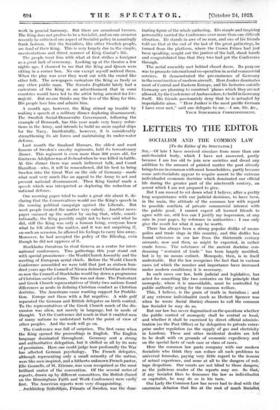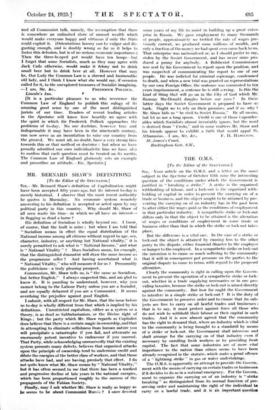LETTERS TO THE EDITOR
SOCIALISM AND THE COMMON LAW [To the Editor of the SPECTATOR.]
Sin,—Of late I have received circulars from more than one anti-Socialist body, which I have not answered, partly because I am too old to join new societies and dread any addition to the amount of printed matter the post already brings to me in common with most householders, partly because some anti-Socialists appear to require assent to the extreme individualist economic doctrine which dominated our official life during the greater part of the nineteenth century, an assent which I am not prepared to give.
But I am moved to set down what I believe, after a pretty long acquaintance with our judicial decisions, to have been, in the main, the attitude of the common law with regard to possible conflicts of private commercial interest with- the public good. I cannot expect all learned friends to agree with me, still less can I justify my impression, at any- rate in your pages, by reference to authorities : I can only give the result for what it may be worth.
" There has always been a strong popular dislike of mono- polies and trade" rings in this country, and this dislike has found utterance in our law from- the thirteenth century - onwards, now and then, as might be expected, in rather crude forms. The substance of the ancient doctrine con- demning " restraint of trade " has been largely modified, but is by no means extinct. Monopoly, then, is in itself undesirable. But the law recognizes the fact that in various cases (of which the number and importance have increased under modern conditions) it is necessary. - In such cases our law, both judicial and legislative, has acted for something like two centuries on the principle that monopoly, where it is unavoidable, must be controlled by public authority acting for the Common welfare. -
This, I believe, is the grain of truth in Socialism ; and if any extreme individualist (such as Herbert Spencer was when he wrote Social Statics) chooses to call the common law Socialist he may do so.
But our law has never dogmatized on the questions whether" the public control of monopoly shall be central or local: and whether it shall be exercised by direct official adminis- tration (as the Post Office) or by delegation to private enter= prise under regulation (as the supply of gas and electricity in London). These and other incidental doubts are left to be dealt with on grounds of economic expediency and on the special facts of each case or class of cases.
Here the common law parts company with our modern Socialisti who think they can reduce all such problems to universal formulas, paying very little regard to the lessons" of actual experience, and none at all to the dangers of red- tape despotism. Our courts are not blind to those dangers,1 as the judicious reader of the reports may see. So that,' if any Socialist likes to denounce the law as individualist or capitalist, he may do so in his turn.
Our Lady the Common Law has never had to deal with the enormous delusion that lies at the. root of much Socialist
and all Communist talk, namely, the assumption that there is somewhere an unlimited store of unused wealth which would make everyone happy and virtuous if only the State could exploit it. (Ostentatious luxury can be vulgar and dis- gusting enough, and is doubly wrong so far as it helps to foster this delusion. but is of no serious economic importance.)
Then the three-hcoped pot would have ten hoops—but I forget that some Socialists, much as they may agree with
Jack Cade otherwise, would make it felony not to drink small beer but to drink beer at all. However that may be, Our Lady the Common Law is a shrewd and businesslike old lady, and I think I know what she would say, if occasion called for it, to the unexplored treasures of Socialist imagining.
[It is a particular pleasure to us who reverence the Common Law of England to publish this eulogy of its amazing good sense by one of the most distinguished jurists of our time. Readers of recent leading articles in the Spectator will know how heartily we agree with the spirit in which Sir Frederick Pollock approaches the problems of to-day. No one doctrine, however true and indispensable it may have been in the nineteenth century, can now serve as an incantation to raise our -country from the ground. We must all, no doubt, have a very strong bias towards this or that method or doctrine ; but when we have proudly admitted our own individualistic bias we have also to confess that each question must be treated on its merits. The Common Law of England gloriously sets an example and prescribes an attitude.—ED. Spectator.]































































 Previous page
Previous page